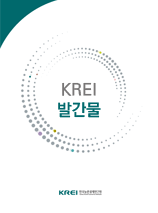요약문
박근혜 정부가 한반도 신뢰프로세스 구축을 국정과제로 제시하면서 남북관계 개선의 새로운 전환점을 맞이하였다. 북한 황폐산지 복구는 남북한이 신뢰관계를 쌓아갈 수 있는 대표적인 협력 사업이다. 남북이 정치적 부담 없이 함께 추진할 수 있는 사업일 뿐 아니라, 북한이 경제적으로 성장하기 위해서도 황폐산지 복구는 선결되어야 할 중요한 과제이다.
이 연구는 이러한 배경에서 시작되었다. 앞으로 한반도 신뢰프로세스 구축을 위해서 정부에서 협력 사업을 시작한다면 남한의 산림녹화 성공경험을 활용하여 북한의 황폐화된 산지를 복구하는 것을 우선적으로 고려할 수 있다. 또, 최근 세계적인 환경이슈인 기후변화에 대응하여 한반도의 환경을 보호하면서 성장을 추구한다면 서로 상생하는 협력이 될 것이다.
북한 황폐산지 복구를 위해서는 나무를 심는 것도 중요하지만, 황폐화가 되는 근본적인 원인인 식량난과 연료난과 같은 사회경제적인 요인들도 함께 고려하여야 한다. 이런 근원적인 문제들이 해결되지 않으면 산림복구 사업은 단기적인 응급처방으로만 끝나게 되고 지속가능성을 담보할 수 없다.
이에 이 연구는 북한 황폐산지 복구를 위한 현실적이고, 실행가능하고, 체계적인 대책을 제시하여 한반도 신뢰프로세스를 구축하고자 하는 정부의 대북정책을 뒷받침하는 데 목표를 두고 있다.
The purpose of this study is to develop the strategy of the restoration and conservation of deforested and degraded mountainous areas in North Korea, through inter-Korean cooperation in the field of forestry. Previous studies fell short of suggesting realistic inter-Korean cooperation projects for restoring deforested and degraded forests in North Korea. This study contributes to suggesting practical, feasible projects for restoring and managing devastated mountainous areas, 2.84 million ha (2008, base year), by scientific approaches. The forested area of North Korea is 5.22 million ha in 2012. Since 2000, deforested areas have increased by 13,464ha per year on average. Between 2000 and 2012, about 160,515ha was deforested, which is 11.7 times as large as the newly planted area (13,680ha). Thus, North Korea has experienced a very serious forest degradation. Although the North Korean government recognized the critical issue, degraded forests are more likely to increase because North Korea still faces the issues of food and fuel shortage.
This study explores how to restore deforested and degraded mountainous areas according to the regional characteristics by focusing on study areas in which GIS data are available from 2000 to 2012. Based on elevation, slope, and canopy, indicating the accessibility and the risk of soil erosion of a region, we defined three types of potential projects: Agroforestry, A/R CDM, and REDD/REDD+. Also, we consider the threshold of those projects: the elevation: 600m; the slope: 20 degrees; and the canopy coverage: 50 to 80 percent.
From results, we found that the low slope area (88,553ha) is appropriate for practicing agroforestry that targets not only forest restoration but also food production. For the high slope area (71,963ha), the A/R CDM project is applicable by targeting only forest restoration. Because high elevation limits human access to an area of over 600m, for other areas at high risk of degradation due to the low slope, we may consider REDD+ projects. Depending on the coverage of crown canopy, we can apply three types of combining projects: (1) agroforestry and REDD+, (2) forest management and REDD+, and (3) REDD projects. We also suggest REDD projects for steep areas despite low elevation (<600m) because of soil erosion risk.
For the success of these projects, a good relationship between South Korea and North Korea is necessary. For inter-Korean cooperation in the field of forestry, institutions such as laws need to be established. It is also important that a national consensus can be made before inter-Korean cooperation projects begin. Thus, the government, research institutes, universities, NGOs and other public agencies and private organizations need to cooperate and involve in the national needs together to build inter-Korean cooperation. In order to overcome the political difficulties and uncertainties, we may build a cooperative system with international organizations and use international conferences in the academic world.
Researchers: Seok Hyun-deok, Kim Young-hoon, Lee Yo-han, Koo Ja-choon, Park So-hee, Lee Chan-hwi, Yoon Taek-seung
Research period: 2014. 4. ~ 2014. 6.
E-mail address: hdseok@krei.re.kr
저자에게 문의

저자소개
- 석현덕
(Seok, Hyundeok)
저자에게 문의

※ 퇴사하신 분이지만 아래의 내용을 입력해 주시면 관리자가 전달해드리겠습니다.
구매안내
KREI의 출판물은 판매 대행사 (정부간행물판매센터)와 아래 서점에서 구입 하실 수 있습니다.
판매대행사
- (주)정부간행물판매센터http://www.gpcbooks.co.kr사이트 바로가기
- 서울특별시 중구태평로 1가 25번지
- TEL 02) 394-0337, 734-6818
- FAX 02) 394-0339
판매서점


